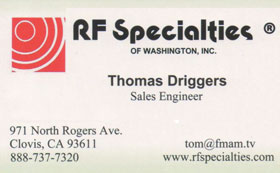Module 1 – Introduction to Radio Frequency (RF)
Instructional Method: Live webinar, January 26, 2017 2:00 pm – 3:30 pm ET

Registration and PricingSociety of Broadcast Engineers
Overview
RF101: Broadcast Terrestrial Transmission Systems course is an introductory survey of the RF fundamentals needed to successfully monitor a broadcast facility. The course is targeted to those with minimal or no background in RF and/or are relatively new to the field. It will also serve as a refresher for more seasoned engineers. Many come to the field of Broadcasting from varied backgrounds such as IT, electronic technicians or military vets, and find themselves immersed in the complexity of a broadcast facility needing to understand and work with the RF end of the system. This multi-module course will present an overview of RF needed to understand the basics and make informed decisions. RF101 modules will be presented in eight 1-1½ hour webinars, with the first, “Introduction to Radio Frequency (RF),” being presented on January 26, 2017 at 2 pm ET.
Module 1 of RF 101: Broadcast Terrestrial Transmission Systems is Jan. 26
This first webinar, Introduction to Radio Frequency (RF), will include the following topics: Definition of RF and Electromagnetic radiation and spectrum, Electric and magnetic fields, The Inverse Square Law and Attenuation of EM waves, Frequency bands and RF wave characteristics, Units of power: dB and dBm, History of RF, and Safety issues introduction: Exposure and limits.
The remaining modules will be presented over the coming months. Watch for further announcements.
RF101: Broadcast Terrestrial Transmission Systems Course Modules
- Introduction to Radio Frequency (RF) January 26, 2017
- Transmission Lines
- Towers, Antennas, and Transmission Systems
- Antenna Gain – Feed-line Loss
- Modulation Fundamentals
- AM, FM, TV RF Propagation
- RF Transmitter Measurements
- FCC Regulations
Upon completion of the entire course, attendees will be able to 1) Understand the basic characteristics of RF and electromagnetic radiation; 2) Describe different types of transmission lines, antennas, and their characteristics; 3) Understand the fundamentals of RF propagation; 4) Understand modulation and different modern modulation methods; 5) Describe various components used in RF communications systems; 6) Explain the basic characteristics of RF transceiver systems; 7) Define common terms used to characterize RF systems; 8) Understand how to perform a range of basic RF measurements; 9) FCC regulations pertinent to maintaining a broadcast facility.
About Your Instructor: Dennis Baldridge, CPBE, 8-VSB, AMD, DRB, CBNT
Ins tructing and the creator of the RF101: Terrestrial Transmission Systems course is Dennis Baldridge, CPBE, 8-VSB, AMD, DRB, CBNT, a veteran of the broadcast engineering field for more than 30 years. Baldridge is a Senior member of the SBE, holds an FCC Lifetime General License (formerly a First Class FCC License) and Amateur Radio Extra Class License (K0DB). He also holds a M.A.E. and teaches science courses for Upper Iowa University. As owner of Baldridge Communications, LLC, he works as a contract engineer and has also authored articles for Radio Guide. Baldridge serves as an inspector for the FCC Alternate Inspection Program of the Wisconsin Broadcasters Association.
tructing and the creator of the RF101: Terrestrial Transmission Systems course is Dennis Baldridge, CPBE, 8-VSB, AMD, DRB, CBNT, a veteran of the broadcast engineering field for more than 30 years. Baldridge is a Senior member of the SBE, holds an FCC Lifetime General License (formerly a First Class FCC License) and Amateur Radio Extra Class License (K0DB). He also holds a M.A.E. and teaches science courses for Upper Iowa University. As owner of Baldridge Communications, LLC, he works as a contract engineer and has also authored articles for Radio Guide. Baldridge serves as an inspector for the FCC Alternate Inspection Program of the Wisconsin Broadcasters Association.
SBE Recertification Credit
The completion of this webinar from Webinars by SBE qualifies for 1 credit, identified under Category I of the Recertification Schedule for SBE Certifications.
Registration and Pricing
Registration for each module will be done separately. Click Register Now below, to register for Module 1.
SBE Members: $57
Non-Members: $87
Questions?
If you have questions regarding this webinar, contact John Poray via email or by phone at 317-846-9000.


